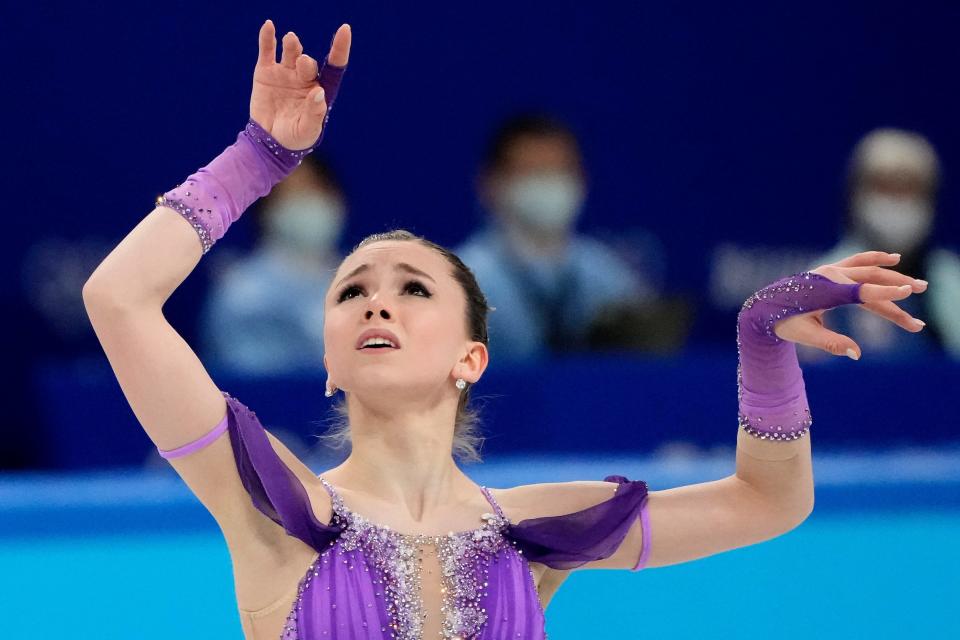IOC getting what it deserves for not holding Russia accountable for doping | Opinion
BEIJING – The first, second and third time Russia got away with its egregious doping schemes somehow emboldened it to believe it could get away with it again.
Imagine that!
Figure skating phenom Kamila Valieva’s positive drug test has the potential to overshadow the rest of the Winter Games in Beijing, creating a crisis that is entirely of the International Olympic Committee’s own making. Every time it has had the opportunity to take a hard stance with Russia, to defend clean athletes and the integrity of its own Games, the IOC has proven to be spineless.
Why on earth would the Russians, be it collectively or individually, stop cheating when they know there won’t be any repercussions from the IOC? They’re not going to magically recognize the error of their ways or suddenly decide they should do the right thing. They’re going to keep on breaking the rules and undercutting the Olympic values, laughing at the IOC and all the law-abiding suckers on their way to the top of a medals table they’re not even supposed to be on.
MEDAL COUNT: Where does Team USA rank
BEIJING TEXT UPDATES: Get behind-the-scenes access to the Winter Olympics
NEVER MISS A MOMENT: Subscribe to our Olympics newsletter to stay informed

“The whole credibility of the Olympic movement and the Paralympic movement stands teetering on the edge of us saying that we really believe and live the values that we say we stand for,” Susanne Lyons, chair of the U.S. Olympic & Paralympic Committee board, told Around the Rings on Thursday.
“And I just hope that’s what we’ll see in this specific situation that’s happening.”
Good luck with that.
The IOC hid behind org charts and legalese Thursday when pressed on the status of both the medals ceremony for figure skating’s team event and Valieva.
The 15-year-old reportedly tested positive before the Beijing Games for trimetazidine, a heart medication that has been banned since 2014 because it can boost blood flow and endurance – which would seem to be of use for, oh I don’t know, a skater trying to master quadruple jumps.
Valieva became the first woman to do a quad at the Olympics, landing two of them to help Russia secure the team title. She’s a heavy favorite to add a second gold in the women’s event.
“I’m not going to comment on all sorts of speculation,” IOC spokesman Mark Adams said. “It has legal implications, and I hope you appreciate I am not going to going to comment on a legal case because it wouldn’t be appropriate.”
Neither is trying to do an end-around the rules, but here we are.
This brewing debacle is exactly what everyone – well, everyone not trying to curry favor with Russia – feared when IOC president Thomas Bach refused to punish Russia for the sophisticated doping program designed to ensure the hosts won the medal count at the Sochi Games.
Russia had come up with a performance-enhancing drug cocktail that it believed was undetectable but, just to make sure, bored mouse holes through the walls of the official anti-doping laboratory in Sochi so state security agents could swap tainted samples for clean ones. That’s the stuff of spy movies, not sporting events, and if anything merited getting kicked out of the Games it would be that.
Yet Bach waved it off, saying all countries had athletes who cheated and it wasn’t fair to punish the many for the sins of a few. He ignored calls to bar the entire Russian team in 2016 and, when additional proof of Russia’s shenanigans forced him to do something, ensured the half-measure “bans” for the 2018, 2020 and now 2022 Games would be as toothless as possible.
The message was clear: Russia was untouchable. And it has responded accordingly.
The uniforms its athletes – sorry, athletes from the Russian Olympic Committee – wore in the opening ceremony had the Russian flag on the sleeve, despite any display of it being specifically banned. Vladimir Putin was supposed to be persona non grata but found a way in, anyway. Now one of Russia's highest-profile athletes has been busted.
When, or if, Bach ever comments on Valieva’s case, he’s sure to say this was an isolated incident. One athlete – or, given that she’s 15, her coach – going rogue. But that misses the point.
From the time Russia was awarded the Sochi Games, its Olympic program was driven by deception. Cutting corners was not only accepted it was expected if it meant a quicker path to the podium. The dirty details were ignored so long as they brought success.
When that attitude is pervasive, no one is going to think twice about pushing a 15-year-old to take medication normally used to treat angina. The only concern is whether it will work.
"One of the most important values is integrity of sport," Lyons told Around the Rings. "And it’s just terribly upsetting to the athletes today to have that wound potentially reopened again."
Upsetting, yet utterly predictable.
Follow USA TODAY Sports columnist Nancy Armour on Twitter @nrarmour.
This article originally appeared on USA TODAY: Russia's latest doping scandal a sad reflection of IOC's indifference

